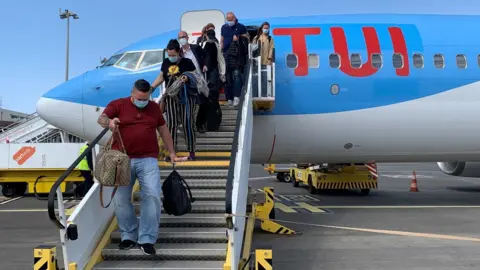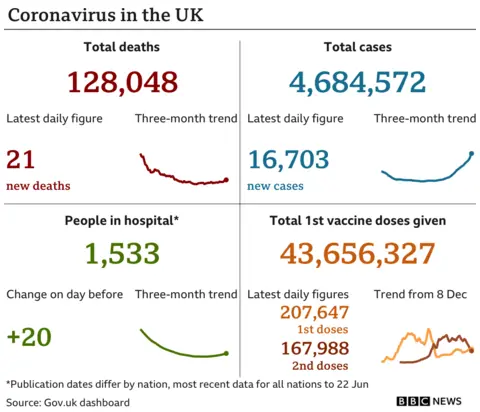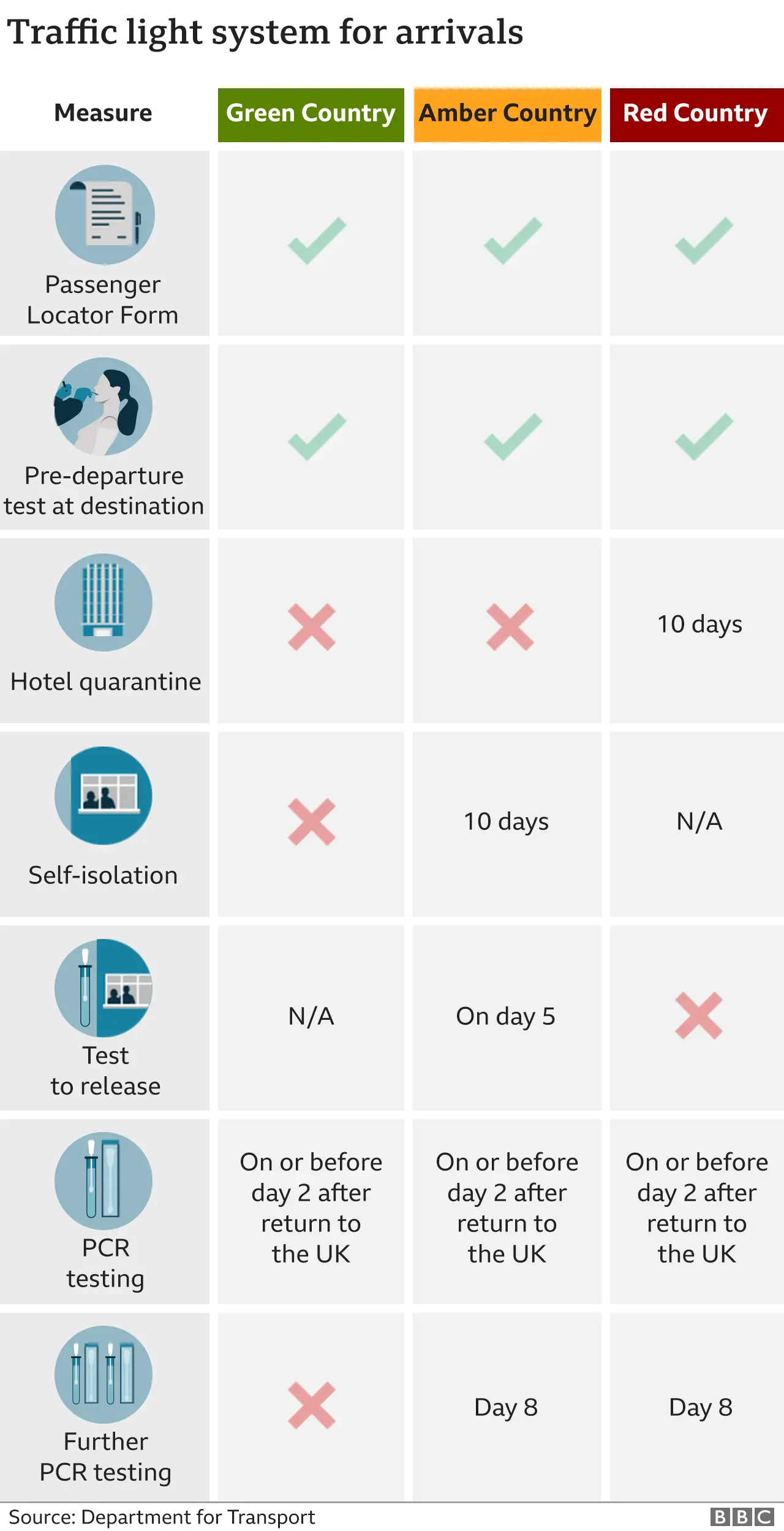Covid: UK's foreign travel 'traffic light' lists due to be announced
 PA Media
PA MediaChanges to the UK's rules on foreign travel are set to be announced later, after industry bosses united in a plea for the green list to be widened.
There has been speculation Malta and the Spanish islands of Ibiza, Majorca and Minorca could be green listed.
Travel bosses are also calling for an exemption to quarantine for fully-vaccinated people from amber countries.
PM Boris Johnson said there was a "real opportunity to open up travel" this summer for those who have had two jabs.
But the prospect of European holidays could face another hurdle, after German Chancellor Angela Merkel suggested all EU countries should make British travellers quarantine on arrival to slow the spread of the Delta variant.
On Thursday, the UK reported 16,703 cases and 21 deaths within 28 days of a positive coronavirus test.
Mrs Merkel told Germany's parliament: "In our country, if you come from Great Britain, you have to go into quarantine - and that's not the case in every European country, and that's what I would like to see."
Currently, people travelling from the UK to Greece, Spain and Portugal are not required to quarantine. Those going to Italy have to self-isolate for five days then take a test, while fully-vaccinated UK visitors to France can enter without quarantining.
By contrast, when returning to the UK from most holiday hotspots on the amber list, travellers have to self-isolate for 10 days, as well as pay for tests.
Asked about Mrs Merkel's remarks on the Delta variant meaning more restrictions on British travellers going abroad, Mr Johnson said: "The most important thing is that we think double jabs do offer a good way forward, we think they offer the hope of travel this summer.
"More than 60% of our population have now had two jabs, I think 83% have had one jab, we're really getting through it now. The crucial thing is, come forward and get your second jab," he said.
He added that he wasn't going to claim the summer would be like any other. "I don't want to cast a pall over things but, as I said the other day, it will be different."

'It's safer here than at home'
 Tom Singleton
Tom SingletonTom Singleton, from Derby, is on a family holiday with his wife and four-year-old daughter on the very quiet Greek island of Kos.
They had originally planned to go to Cyprus but had to cancel three times.
Determined to get away before their daughter starts school in September, the family flew to Kos - on the amber list - on a virtually empty plane to stay in a deserted hotel.
"Until yesterday we were the only British people in our hotel," he told the BBC.
Tom and his wife are both fully-vaccinated and hopeful - if a little doubtful - Kos might be moved on to the safer green list which would save them from quarantining.
"Cases are very minimal here and it's safer here than at home - it makes no sense why it can't be green," he said.
He highlighted some of the apparent contradictions in the travel rules, asking how Uefa VIPs, sponsors, staff and guests could come into the UK "from wherever" without quarantining.
"It begs the question why one rule for the few and another for everyone else."

Just 11 destinations are on the green list - including Israel and Australia - although neither has opened up its borders to tourists. Travellers do not need to quarantine when they get back from green-list countries, but they do have to pay for tests.
Countries on the red list are considered the highest risk, and travel from those nations is more strictly limited.
The UK government reviews which countries are on which list every three weeks, and the last update - when Portugal was stripped from the green list - was three weeks ago on 3 June.
As well as today's review, the government has also said there will be a "checkpoint" review of the rules for each category on Monday 28 June. That could be when ministers decide whether to relax quarantine for fully-vaccinated travellers.
On Wednesday, Mr Shapps told the BBC: "If you've been double vaccinated then of course we need to look at what the science says. We've said that Monday is the point to review that data, so we are coming up to having a look at it.
"We're looking at it in the next few days and I'll have more to say."
The UK government's traffic light system applies to England, with Scotland, Wales and Northern Ireland able to make their own rules. However, the rules are broadly the same and previous changes to the lists have been adopted by all four nations.




The issues around international travel in Europe are tricky, complex and ever-changing.
In the spring the UK had one of the lowest infection rates in Europe - so it was perhaps understandable that ministers did not want Britons going abroad where there would be a greater risk of infection.
The opposite is true now following the rise of the Delta variant. So in theory a Briton in France, Germany, Spain or Italy is less likely to get infected than they are here.
But that means there is a stronger argument for countries in continental Europe to restrict access for Britons.
Indeed, a number of countries have already started, citing concern about the Delta variant.
Although with clusters of it found across Europe it's probably only a matter of time before it takes off.
The fact remains holidaying in continental Europe could still be very difficult regardless of what ministers decide here.

Earlier this week, Health Secretary Matt Hancock said ministers were "working on" plans for fully-vaccinated people to be exempt from quarantine if they returned from amber-list countries.
More than 60% of UK adults have now been fully vaccinated, while 82.9% have had their first jab.
On Wednesday, workers in the travel industry including cabin crew, pilots, travel agents and airport staff held a series of protests against the rules.
They called on the government to offer the industry more financial support and increase the number of countries on the UK's green list.
And industry body Abta, representing travel agents and tour operators, estimated 195,000 travel jobs have been lost during the pandemic or are at risk.
The government said its international travel policy was guided by "one overwhelming priority - protecting public health".
It said a range of factors were considered when making decisions about countries - including how capable a country is at genomic sequencing, the risk of transmission and the risk from any variants of concern.
The government added it was keeping all possible travel measures under review, and that economic support for the sector included the furlough scheme.




- "I'M STILL REALLY STRUGGLING": Hayley deals with bankruptcy after losing her home due to the cladding crisis
- RE-LIVE GLASTONBURY HIGHLIGHTS: Stormzy's historic Pyramid Stage debut

